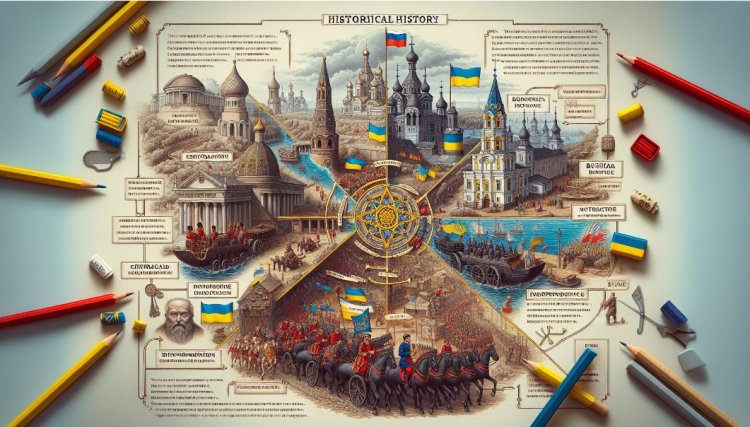Understanding Russia's Perspective on Ukraine: A Historical Context
Beyond the headlines: Delve into Russia's historical, cultural, and security concerns regarding Ukraine. Uncover the complexities of the conflict and gain insights into potential solutions.

Introduction
In a nationwide address in February 2022, the Russian President addressed the conflict in Ukraine and expressed his belief that the United States, through NATO, posed a potential threat to Russia. This statement may sound paranoid to American ears, but the president argued that it was a serious discussion that needed to take place. To understand Russia's perspective on Ukraine, it is crucial to examine the historical context of the region.
Ukraine has a complex history, with its origins dating back to the establishment of the Russian state in 862. Over the centuries, Ukraine has experienced periods of centralization, decentralization, and foreign influence. It was only after the collapse of the Soviet Union in 1991 that Ukraine gained independence as a sovereign state.
In this section, we will provide an overview of the key points discussed in this blog. We will explore the nationwide address by the Russian President, clarify the perceived threat from the United States, set the tone for a serious discussion on the historical context of Ukraine, and provide an outline of the subsequent sections.
Historical Background of the Russia-Ukraine Relationship
The relationship between Russia and Ukraine has a long and complex history, dating back to ancient times. Understanding this historical background is crucial to comprehending the current tensions between the two countries. Here are some key points:
The Ancient Origins of Russia and Ukraine
The origins of both Russia and Ukraine can be traced back to ancient times. The establishment of the Russian state in 862 marked the beginning of Russian civilization, while Ukraine has its roots in the ancient city of Kyiv.
Establishment of the Russian state in 862
In 862, the Russian state was established when Prince Rurik from Scandinavia was invited to rule over the region. This marked the beginning of a centralised Russian state, with its capital in Novgorod.
Centralization of the Russian state and the role of Ukraine
Over the centuries, the Russian state has gone through periods of centralization and decentralisation. Ukraine played a significant role during the centralization period, with cities like Kyiv serving as major centres of power.
Partitioning of the Russian state and the influence of Poland and Lithuania
In the 13th and 14th centuries, the Russian state experienced partitioning, with parts of its territory falling under the influence of Poland and Lithuania. These foreign powers sought to assimilate the Russian population in these regions.
The integration and independence struggles in Ukraine
Throughout history, Ukraine has faced numerous struggles for independence and integration. The integration of Ukraine into the Russian state happened in 1654, while the struggle for independence intensified during the 20th century.
Despite gaining independence as a sovereign state in 1991, Ukraine continues to face challenges in defining its relationship with Russia and asserting its independence.
This historical background provides important context for understanding the complexities and tensions in the Russia-Ukraine relationship. It highlights the influence of external powers, internal struggles, and the ongoing quest for independence. By recognising this historical context, we can better comprehend the current dynamics between these two nations.
The Impact of Ukrainian Independence
Ukrainian independence has had a significant impact on the country's history and its relationship with Russia. Here are some key points to consider:
The establishment of Soviet Ukraine
After the collapse of the Russian Empire in 1917, Ukraine experienced a period of political instability. In 1922, Ukraine became one of the founding republics of the Soviet Union, known as the Ukrainian Soviet Socialist Republic.
The promotion of Ukrainian culture and identity
During the Soviet era, there was a push to promote Ukrainian culture and identity. This included the development of Ukrainian-language schools, literature, and media. However, this promotion was often met with resistance from the Russian-speaking population.
The Role of Ukraine in the Soviet Union
As a member of the Soviet Union, Ukraine played a significant role in the country's economy and industry. The region was known for its agricultural production as well as its contributions to the aerospace and defense sectors.
Ukraine's territorial changes after World War II
After World War II, Ukraine experienced territorial changes. The western regions of Ukraine, which had been part of Poland, were incorporated into the Ukrainian SSR. Additionally, Crimea, which had been part of the Russian SSR, was transferred to the Ukrainian SSR.
The rise of Ukrainian nationalism and its consequences
In the late 1980s and early 1990s, there was a resurgence of Ukrainian nationalism as the Soviet Union began to unravel. This led to calls for greater autonomy and, eventually, independence. The rise of Ukrainian nationalism had both positive and negative consequences, including tensions with Russia and challenges in defining the country's identity.
Overall, Ukrainian independence has shaped the country's history and its relationship with Russia. It has allowed for the promotion of Ukrainian culture and identity, but it has also resulted in territorial changes and the rise of Ukrainian nationalism. Understanding these impacts is crucial to comprehend the complexities of the Russia-Ukraine relationship today.
Russia's Perspective on the Ukrainian Conflict
Russia's involvement in the Ukrainian conflict stems from several key factors:
The trigger for Russian action in Ukraine
The trigger for Russian action in Ukraine can be traced back to the events of the Maidan protests in 2014. Following the ousting of Ukrainian President Yanukovych, who had close ties to Russia, a new pro-Western government came into power. This shift in leadership and the potential expansion of NATO into Ukraine raised concerns in Russia about its national security.
The importance of the Minsk Accords
The Minsk Accords, signed in 2014 and 2015, were crucial for establishing a framework for a peaceful resolution to the conflict in Ukraine. These agreements outlined steps for a ceasefire, the withdrawal of heavy weapons, and the restoration of Ukrainian control over the border with Russia. Russia has consistently emphasized the need for the implementation of these accords to achieve lasting peace.
The failure of the Ukrainian leadership to fulfill the agreements
Russia has criticized the Ukrainian leadership for its failure to fully fulfill the commitments outlined in the Minsk Accords. The lack of progress in implementing key provisions, such as the political and constitutional reforms in Ukraine and the granting of special status to the regions of Donetsk and Luhansk, has hindered the peace process.
The impact of Western support on the conflict
Russia believes that Western support, both political and military, for Ukraine has exacerbated the conflict. The provision of weapons and training to the Ukrainian armed forces by Western countries has been seen as a threat to Russian security interests and has contributed to the escalation of the conflict on the ground.
Russia's goal of stopping the war and finding a peaceful resolution
Despite the ongoing conflict, Russia's ultimate goal is to find a peaceful resolution to the Ukrainian crisis. Russia has consistently called for a negotiated settlement that respects the interests and rights of all parties involved. This includes ensuring the security of the Russian-speaking population in eastern Ukraine and the protection of their cultural and political rights.
The Role of NATO and the US in the Conflict
The conflict in Ukraine has not only been a regional issue, but it has also involved NATO and the United States. The actions and decisions of these entities have had a significant impact on the conflict and have shaped the perceptions of both Russia and Ukraine.
Promises made about NATO expansion and their impact on Russia
One of the key factors that has contributed to Russia's concerns and actions in Ukraine is the promise made about NATO expansion. After the collapse of the Soviet Union, there were discussions about the possibility of NATO expanding towards Russia's borders. While no formal agreement was made, there were assurances given to Russia that NATO would not expand eastward. However, over the years, NATO has expanded towards Russia's borders, with countries like Poland and the Baltic states joining the alliance.
This expansion has had a significant impact on Russia's perception of the situation in Ukraine. Russia sees this as a direct threat to its national security and views it as a violation of the promises made regarding NATO expansion.
The perception of US and NATO actions in Ukraine
Russia perceives the actions of the US and NATO in Ukraine as hostile and interventionist. The support provided by the US and NATO to Ukraine, both politically and militarily, is seen as fueling the conflict and exacerbating tensions. Russia believes that Western support is biased and favors the Ukrainian government, which has hindered efforts to reach a peaceful resolution to the conflict.
The impact of sanctions and military support on the conflict
The imposition of sanctions by the US and its allies on Russia has had a significant impact on the conflict in Ukraine. These sanctions have targeted key sectors of the Russian economy and have put pressure on the Russian government. At the same time, NATO nations' military assistance to Ukraine has aided in the escalation of the conflict on the ground.
Russia views these actions as an attempt to weaken its position and undermine its influence in the region. It sees the sanctions and military support as an interference in its internal affairs and a violation of its sovereignty.
Analysis of the motivations behind US actions
The motivations behind US actions in Ukraine can be seen from different perspectives. Some contend that the US supports Ukraine's aspirations for closer ties with the West and wants to promote democracy. Others believe that the US sees Ukraine as a strategic location and wants to counter Russian influence in the region.
Whatever the motivations may be, it is clear that the US has played a significant role in the conflict through its support for Ukraine and its involvement in NATO's expansion towards Russia's borders.
The need for dialogue and cooperation to resolve the conflict
Given the complex nature of the conflict and the involvement of multiple actors, it is essential to prioritise dialogue and cooperation to resolve the conflict in Ukraine. The parties involved, including Russia, Ukraine, NATO, and the US, need to engage in meaningful discussions and negotiations to find a peaceful resolution.
This requires a commitment to respect international law, uphold the sovereignty and territorial integrity of Ukraine, and address the concerns of all parties involved. It also requires a willingness to compromise and find common ground that can lead to a sustainable and peaceful solution.
In conclusion, the role of NATO and the US in the conflict in Ukraine has been significant. Promises made about NATO expansion, the perception of actions taken by the US and NATO, the impact of sanctions and military support, the motivations behind US actions, and the need for dialogue and cooperation are all crucial factors that need to be considered in understanding the role of these entities in the conflict.
The Global Implications of the Conflict
The conflict in Ukraine has significant global implications that extend beyond the region itself. It raises concerns about the potential risk of a global war or nuclear conflict. The involvement of major world powers, such as Russia, the United States, and NATO, has escalated tensions and increased the potential for a wider conflict.
It is crucial to find peaceful solutions to the conflict to avoid the devastating consequences of a global war. The use of diplomacy and negotiations, as well as adherence to international law and agreements, is essential in resolving the conflict and preventing further escalation.
In addition to the risk of a global war, the conflict has significant economic and political consequences. The ongoing instability in Ukraine and the surrounding region has disrupted trade and investment, leading to economic challenges for both Ukraine and its neighbouring countries. The political implications of the conflict have strained diplomatic relations between Russia and the West, leading to sanctions and counter-sanctions that have further impacted the global economy.
The role of the US dollar and the impact of sanctions are also major considerations in the conflict. Sanctions imposed by the United States and its allies on Russia have had significant economic consequences, affecting industries and businesses in both countries. The use of the US dollar as the dominant global currency has also been a point of contention, with Russia seeking to reduce its dependence on the dollar and promote alternative financial systems.
Addressing the conflict requires international cooperation and dialogue. It is essential for all parties involved, including Russia, Ukraine, NATO, and the United States, to engage in meaningful discussions and negotiations to find a peaceful resolution. This requires a commitment to respect international law, uphold the sovereignty and territorial integrity of Ukraine, and address the concerns of all parties involved.
Overall, the conflict in Ukraine has far-reaching global implications. It is crucial to prioritise peaceful solutions, economic stability, and political cooperation to avoid the risk of a global war or nuclear conflict. International cooperation and dialogue are key to resolving the conflict and promoting stability in the region.
The Path Towards Resolution
Resolving the conflict between Russia and Ukraine requires a multi-faceted approach that addresses key issues and promotes cooperation and understanding. The path towards resolution includes the following talking points:
The Importance of Denazification and Addressing Ukrainian Nationalism
One of the crucial steps towards resolving the conflict is denazification and addressing Ukrainian nationalism. This involves discouraging the glorification of Nazi collaborators and ensuring that neo-Nazi movements are prohibited at the legislative level. By promoting a culture of inclusivity and tolerance, Ukraine can move towards a more unified and peaceful society.
The need for talks and negotiations to find a resolution
A peaceful resolution to the conflict can only be achieved through talks and negotiations. All parties involved, including Russia, Ukraine, NATO, and the United States, must engage in meaningful discussions to find common ground. These talks should be focused on finding a compromise that upholds the sovereignty and territorial integrity of Ukraine while addressing the concerns of all parties involved.
The Potential for a Change in US Leadership and Its Impact
The potential for a change in US leadership can have an impact on the conflict in Ukraine. A new administration may take a different approach to the issue and prioritize diplomatic solutions. It is important to continue open lines of communication and engage in dialogue with the new US leadership to find a peaceful resolution.
The Importance of Achieving a Balanced Global Order
The resolution of the conflict in Ukraine is crucial for achieving a balanced global order. All nations need to respect international law, uphold the sovereignty and territorial integrity of Ukraine, and work towards peaceful coexistence. By addressing the concerns of all parties involved and promoting a fair and just resolution, a balanced global order can be achieved.
The Role of Cooperation and Understanding
Cooperation and understanding are key to resolving the conflict. All parties involved must be willing to listen to each other's perspectives, engage in meaningful dialogue, and work towards finding common ground. By fostering a culture of cooperation and understanding, a peaceful resolution can be achieved.
Conclusion
In conclusion, this blog has provided a comprehensive understanding of Russia's perspective on Ukraine from a historical context. It has highlighted key points discussed throughout the blog, including the trigger for Russian action in Ukraine, the impact of Ukrainian independence, Russia's perspective on the Ukrainian conflict, the role of NATO and the US, and the global implications of the conflict.
Recapping the key points discussed in the blog, it is clear that a comprehensive understanding of the conflict is necessary to grasp the complexities and tensions between Russia and Ukraine. The need for dialogue and cooperation between nations is crucial to finding a peaceful resolution. Through dialogue and cooperation, a more stable and balanced global order can be achieved.
The significance of the topic cannot be undermined, as it has far-reaching implications for global stability, economic relations, and diplomatic ties. It is important for all parties involved to prioritize peaceful solutions, economic stability, and political cooperation to avoid the risk of a global war or nuclear conflict.



 admin
admin 










